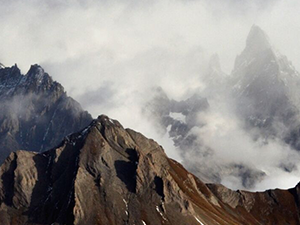TOURISM
PATHWAY 3
TOURISM
PATHWAY 3
Exploring the use of tourism packages for climate-neutral tourism

Basic information:
High role of nature-based tourism in the Alps, potential for developing the Alps into model-region for climate-neutral tourism.
Sustainability considerations play a more and more important role for the choice of tourism destinations. Especially in the Alps, with its high role of nature-based tourism, many tourists are already aware of the need for better protecting the Alps as sensitive environment and for reducing the CO2-footprint of their holidays. There is already a growing demand for low-carbon holiday offers, e.g., tourists chose their hotels according to existence of energy-labelling schemes, availability of regional products, provision of public transport services, bike rental options, etc. However, tourism stakeholders have difficulties in clearly defining options to reduce the CO2-footprint of their operations and in including them in their marketing activities. An integrated approach with the provision of climate-neutral and climate-resilient tourism packages would help to overcome this problem and would provide a clear signal for tourists on climate mitigation and adaptation activities in specific hotels and/or tourism destinations and would give a clear framework to tourism stakeholders on need for action.
Sequence of implementation steps:
In a first step, a review will identify existing offers and services regarding the provision of climate-neutral tourism packages (Alpine countries, other EU countries, other mountain regions worldwide). The review will provide an overview on all relevant aspects which are covered in these existing approaches (e.g., energy management systems, labelling systems on organic products, “slow food”, transport-related labels, etc.). Also, the review will provide information on methodological approaches, especially the methodologies for calculating the relevant carbon footprints of these packages and the use of compensation measures.
A special focus during this review will be the acceptance and feasibility aspects of the existing tourism packages. An Alpine-wide approach for providing climate-neutral tourism packages should be attractive in form of low administrative hurdles/limited reporting needs but should at the same time remain effective.
Based on the results of step 1 and also on Step 2a: Open-access manual for climate proofing Alpine tourism of pathway IP_Tou2 “Coaching and capacity building for climate proofing Alpine tourism”, a framework for climate-neutral tourism packages for Alpine tourism is developed, This framework should take into account all climate-relevant fields of action in the tourism sector, with a special focus on CO2-free buildings, low-carbon transport within and to the destinations, food and beverages but also including criteria for communication & awareness raising campaigns which need to be implemented by applicants.
The development of the framework is conducted in a broad participatory approach, taking into account relevant tourism stakeholders and the needs and demands of tourists.
In this step, the feasibility of providing fully climate-neutral holiday offers in the Alps will be tested. Within several pilot projects, tourism destinations in all Alpine countries will test the provision of “climate-neutral tourism packages”, which can be booked as care-free holiday packages.
Based on the activities in step 3, common measures for promotion and dissemination of the climate-neutral tourism packages are developed. Also, this working step includes the set-up of a control mechanism for monitoring effectiveness and application of the climate-neutral tourism packages.
Further Information:
- National and regional administrations involved in tourism development
- Representatives/stakeholders of tourism destinations
- NGOs involved in promoting sustainable tourism (CIPRA, Alpenvereine, ALPARC e.g.,)
- Regional coordinators as implemented in other fields of action
- Synthesis on existing approaches for providing climate-neutral holiday packages
- Recommendations on the provision of climate-neutral tourism packages in the Alps
- Fully climate-neutral tourism packages to be tested in several pilot sites
- Framework for common promotion of climate-neutral tourism packages and reporting framework
- Step 1: Development of synthesis yes/no + qualitative descript
- Step 2: Development of framework for climate-neutral tourism packages yes/no + qualitative description
- Step 3: Number of pilot projects to develop “climate-neutral tourism packages”
- Step 4: Set-up of destination management framework yes/no + qualitative description
- RSA4 “Sustainable Tourism in the Alps – Report on the State of the Alps” (2013)
- “Mobility solutions in the Alps” database (2015)
- Report of the WG Sustainable Tourism (2016)
- Activities implemented in the frame of the German Presidency: “Best practice guide on energy management in Alpine hotels” (stock-taking No. 41), “Workshop “Sustainable Economy in the Alps – Climate mitigation and Energy Efficiency in Hotel and Restaurant businesses” (stock-taking No. 42), “Online platform “Alpine Energy” for knowledge transfer on Energy Efficiency in the Hotel and Restaurant businesses” (stock-taking No. 43)
- Portal for Sustainable & Responsible Tourism in the EU: https://destinet.eu/Support tools implemented by mountaineering clubs, e.g., “Energieeffizienz im Hüttenwesen (Energy efficient mountain huts)” (stock-taking No. 62)
- Good practice examples and learnings of the participants of the ClimaHost contest that showed innovative solutions for climate protection and energy efficiency in the hotel industry and gastronomy in the Alpine region
- Existing labelling schemes: Alpine Pearls Initiative (stock-taking No. 47), “Bergsteigerdörfer”/Mountaineer Villages (stock-taking No. 61)

